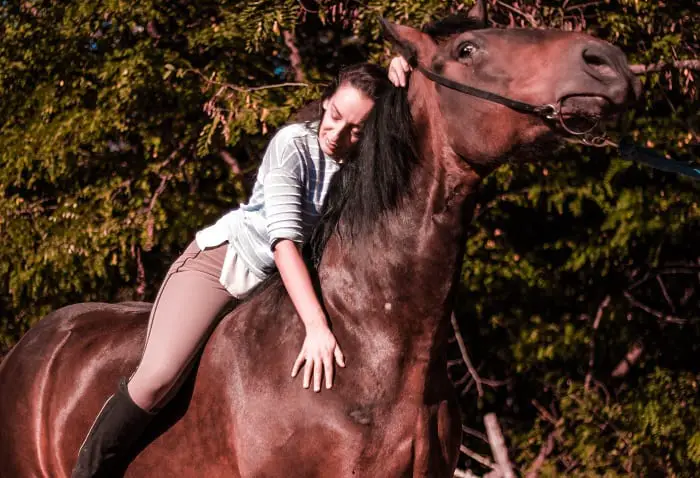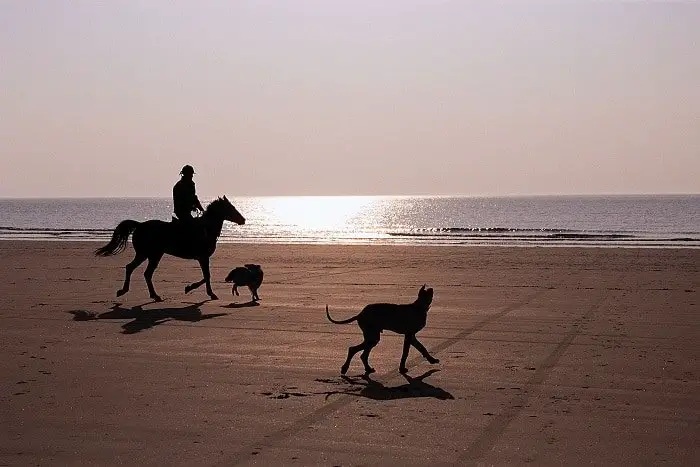Last Updated on December 26, 2022
One question we rarely ask ourselves is whether or not our horses enjoy the work they do with us. We ride our horses daily, and we can tell when they seem to be happy and when they seem to be irritated. But, do horses like being ridden?
But, think about their jobs the way you think about your job. Do you enjoy your job, and what you do at work? Do you dislike certain aspects of it, and enjoy other aspects of it? Horses’ mentalities can be very similar.
There are often certain things horses enjoy and certain things they do not enjoy. But how can we tell? And, how does this transfer into their enjoyment of their work and, in turn, their relationship with their people?
I will be discussing all of this and more in this article. I will discuss some physical signs that your horse may be unhappy, what circumstances may be causing this unhappiness, some signs your horse is happy, and how your horse feels about work in general when all circumstances are good.
Do Horses Like Being Ridden: Signs Your Horse Is Unhappy
Some horses get known for being “grumpy” or “difficult.” Everyone knows the school horse that pins his ears and tries to bite kids as they walk by his stall. But, is he doing this because he hates his job, or is he doing this for another reason?
There are some universal body-language signs that horses are unhappy. The most common is a horse pinning his ears. This means he is angry. Horses can pin their ears at other horses, at people, or at anything that’s causing them irritation.
Another sign a horse is unhappy is bucking. But, be careful with this one; sometimes horses can buck playfully. Bucking or rearing under saddle is normally caused by irritation or frustration while bucking during turnout is typically playful. But, the reverses of these circumstances are also possible.
Horses have unique signs of showing their unhappiness irritation as well, in other words, signs that are not universal. For example, my horse will audibally grunt when you press your leg too hard against his stomach when you’re riding him, or when you ask him to move laterally from the ground. It’s a unique sound, unlike any other that he makes, and I know when he makes it, he’s irritated.
But, these smaller signs will vary from horse to horse, and it will most often take someone familiar with the horse in question to be able to distinguish these signs.
Circumstantial Causes for Unhappiness
Typically, if a horse is unhappy, there is a good reason for it. For example, if a horse pins its ears when you’re tightening its girth, it’s possible that the horse’s stomach hurts or that the saddle doesn’t fit properly and is hurting his back.
If a horse bucks on the backside of the jump, it’s most likely because the rider didn’t follow the horse’s jump with her body, and landed roughly on the horse’s back, causing him some pain.
That school horse that bites at kids when they walk by? He’s probably been handled roughly or even hit by kids for years that don’t understand proper horse handling and care.
None of these situational causes for unhappiness lend any belief that horses do not enjoy work. Instead, they don’t enjoy discomforts and annoyances that accompany it.
Think about your work circumstances. Maybe you love the work you do, but you have a co-worker that heats up a disgusting smelling meal in the microwave every day. You don’t enjoy that, but that doesn’t mean you like your job.
Or, say you love your job, but your desk chair gives you leg cramps or sits your tailbone uncomfortably. No, you don’t hate work, but you definitely hate that chair, and it causes you annoyance and discomfort. Sound familiar?
Signs Your Horse Is Happy
On the other end of the spectrum, there are physical signs that your horse is happy, satisfied, and comfortable. Horses will relax their ears, letting them flop to the sides.
Under saddle, horses will sigh or almost snort, blowing air through their nose when they are relaxed. A truly relaxed horse will often want to stretch its neck and head down to the dirt when under saddle. His hind legs will reach up underneath him for a smooth flowing stride.
Do Horses Like Being Ridden: When All Is Well…
When all is well, horses enjoy work. They enjoy being ridden, and they enjoy routine. Like people, they enjoy having something to occupy their minds, and when it is done properly, horses have no indication of disliking being ridden.
Of course, not every horse is going to be happy being ridden all the time. As I mentioned, horses with ill-fitting saddles may lash out. Horses subject to painful and uncomfortable rider errors may lash out. People sometimes see this as horses not enjoying being ridden.
But, this is not true. If all is well, horses are taken care of, and they are treated the way they ought to be treated, then they will enjoy being ridden, and they will enjoy their work.
Horses get defensive and irritable when they are given reasons to do so. They are also kind and receptive when they are given reasons to do so. They are reflections of the people who own them and care for them.
So, before writing that grumpy school horse off as a “bad horse,” think about what he has been through over his long years, and why he might behave the way he is behaving.
Conclusion
Yes, horses enjoy being ridden. They enjoy routine and they enjoy having a job, the same way people do. But, if we as their riders and caretakers make their jobs miserable, they will no longer enjoy doing them. The same way that you would not enjoy a job where the manager treated you terribly.
So, it is up to us to make sure our horses stay happy and comfortable in their jobs. In return, they will give us their best efforts, and the best partners we could ask for. I hope this article helped you understand horses and their expressions of happiness and unhappiness.
If so, please share this article, and share with us any feedback you may have!
Do horses hate being ridden?
Most horses simply tolerate being ridden rather than hate it or like it. However, this depends on every individual horse, their personality, their previous experiences and of course the rider. Some horses may find being ridden a chore, while others will enjoy it to the max! Some horses may suffer from the back pain associated with riding, while others may have no problems at all and will enjoy time spend with their owners while out on the ride. This is where it all comes together: how well the horse responds to the rider and his commands highly depends on whether he feels safe and comfortable in the rider’s presence and in his tack. When the horse and rider work together they are most likely to have an enjoyable experience.
Why do horses let humans ride them?
Horses allow humans to ride them because of the bond that has been established between a horse and a rider over time through the training and work. Horses are very intelligent, and they learn very quickly. They learn from watching us, and they learn from experience. If you look at the history of the horse, we have domesticated them for thousands of years. We have fed them, kept them warm, and groomed them. In return, we get rides, but we also give them love, affection, and care. The bond is a two-way street. A horse will let us ride it because of this connection that has been established over time.
Do horses need to be ridden every day?
Yes, you can ride your horse everyday, but you don’t want to overwork it. It’s not true that the more you ride the better for the horse – they need to have a rest period to recover after a strenuous workout so they don’t suffer injury.
For a horse who requires only a moderate level of fitness it’s enough be ridden four times per week. Two of these days can involve a bit more intense exercise while the other two days can be more relaxed and an easier, less demanding ride will be enough. In that way you will keep your horse fit but you won’t cause him injuries or health issues because of pushing him too much.
Do horses like to run?
Horses are good at running and jumping because were evolved to do so in the wild. It’s how they run away from predators, it’s how they get food, it’s how they communicate with other horses, and it’s how they defend themselves when attacked. Even though horses have been domesticated for thousands of years and are now trained to run, jump, and do everything else on our command, you can still see them run and jump and play in their natural environment. Just think of foals or young horses playing with their mates when out on the pasture!
Does riding damage a horse’s back?
Scientists determined that when horses are ridden bareback, the areas of their backs that are directly under the pelvis bones of the rider, show higher impact from pressure which can lead to pain and tissue damage to the muscle fibers in a long run. In the saddled horse, the pressure and force is spread over a wider area of the horse’s back, so the impact is reduced.
However, that doesn’t mean that you have to completely abandon the idea of bareback riding—just be cautious about it, specially if you are a bit heavier rider. The occasional bareback ride will not cause damage or hurt your horse but it’s a good idea to monitor your horse’s back for soreness.
Michael Dehaan is a passionate horse owner, horse rider, and lover of all things equine. He has been around horses since he was a child, and has grown to become an expert in the field. He has owned and ridden a variety of horses of different breeds, and has trained many to compete in shows and competitions. He is an experienced horseman, having worked with and competed many horses, including his own. He is an active member of the equestrian community, participating in events and teaching riding lessons.


